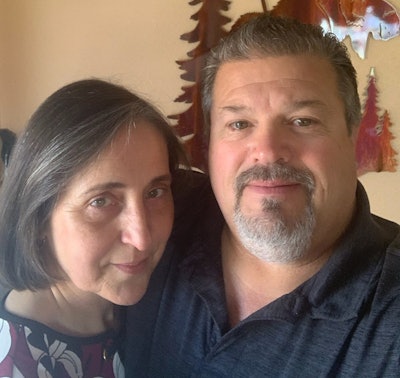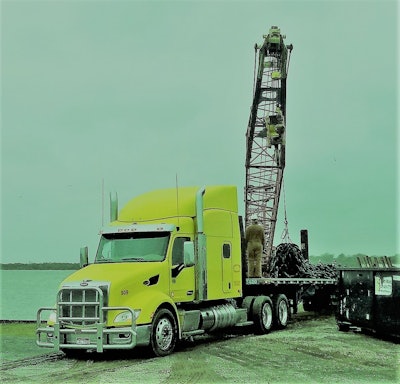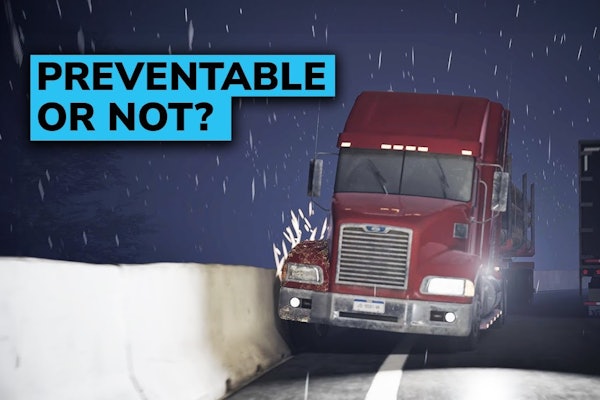The Transportation Intermediaries Association’s August-filed petition is well-known for its request to FMCSA to essentially throw out the transparency reg in place since the early 1980s, earlier than that in other forms. Access multiple discussions of the issues, including the federal listening session dedicated to the topic and small trucking interests’ earlier-filed petitions to, conversely, beef up the reg, via this link. What’s been discussed far less, however, is the second part of the broker group TIA’s petition, having to do with independent dispatchers and/or dispatching services.
TIA asks the agency to provide formal guidance officially limiting such services to working with a single carrier or, in cases where they work with multiple carriers, require a broker authority and bond.
For today’s edition of Overdrive Radio, hear the voice one such independent dispatch service, the one-woman shop of Brittany Hamstreet’s Brittany Dispatch business, headquartered in California.
 Pictured: owner-operator Brian Bent and his better half, Loraine.
Pictured: owner-operator Brian Bent and his better half, Loraine.Owner-operator Brian Bent’s Mountain West Transport is a client of Brittany Dispatch. The owner-operator weighs in on Hamstreet’s crucial service from his point of view, and just what it would mean if additional regulatory requirements eventuated in Hamstreet no longer being available to negotiate loads, collaborate on scheduling and more.
Likewise, viewpoints from two larger businesses that bring technology to bear in a big way in their own efforts to provide value-added services to their independent owner-operator and small carrier clients — Justin Taylor with Merge Transit and Guillermo Garcia of SmartHop.
Take a listen:
What all three of these quite differently structured services agree on — there is in fact a need to at least account for dispatch services working for multiple carriers in regulatory definitions/guidance.
 In the podcast, independent dispatcher Brittany Hamstreet offers a few red flags for owner-ops to look for when considering dispatch providers. See one posting loads on Facebook, for instance, and you could be dealing with an illegal broker, essentially. “We don’t have loads, we have carriers – we’re not contracted to move freight.”
In the podcast, independent dispatcher Brittany Hamstreet offers a few red flags for owner-ops to look for when considering dispatch providers. See one posting loads on Facebook, for instance, and you could be dealing with an illegal broker, essentially. “We don’t have loads, we have carriers – we’re not contracted to move freight.”Taylor, with Merge Transit, argues that a brokerage authority is not exactly difficult or all that costly to set up and maintain. His company actually does have its brokerage license, set up as a matter of prudence early in its existence, he said, and a way to get beyond some brokers’ refusal to negotiate with a multicarrier dispatch provider without an MC number. Yet he also knows that brokering freight isn’t what his company’s doing.
“I got the broker authority and saw how pointless it is,” he said. He’s skeptical of any new regs requirement “if dispatchers get lumped into that category.”
At the same time, Taylor, Hamstreet and others believe targeted definition in regulation could help legit service providers distinguish themselves from the shady bad actors who plague the space with illegal brokering of shippers’ loads obtained by underhanded means from carrier clientele, and/or double-brokering of various kinds.
Regarding the latter, though, it’s not a sketchy practice that is only the provenance of unscrupulous dispatch providers, as SmartHop’s Guillermo Garcia pointed out. “A carrier can do that too,” he said, not to mention a broker, and there are examples out there easy enough to find. Plenty owner-operators and brokers both have pointed to carriers, not dispatch providers, double-brokering loads after agents misrepresented their intentions to act as a carrier with another broker.
 Owner-operator Bent’s 2015 Peterbilt
Owner-operator Bent’s 2015 PeterbiltAs we’ve covered extensively in the past – access our “broker reforms” series from early in 2020 via this link — it’s clear, too, the bonding and broker authority requirement hasn’t exactly served to eliminate bad actors from the brokerage space, as Garcia also underscored. A bonding/broker authority requirement for dispatch providers may change little in that regard.
Brittany Hamstreet remains hopeful, however, that interested parties might be able to work together toward a dispatch-service definition that includes the ability to serve multiple small carriers, in her case exclusively independent owner-operators. Such, she believes, could give ethical dispatch providers an acknowledged place in the business. The bad actors give the good ones, she knows, a terrible name. The “Independent Dispatchers” group on Facebook she helped establish in part to provide such a distinguishing mark, and it could be precursor to something more formal, public or official.
Taylor with Merge Transit has also expressed the need, there. “I believe with the changes occurring, we could benefit from an OOIDA- or TIA-type association geared toward dispatch providers. There definitely needs to be oversight and a clear path for carriers to recognize quality providers. I will always be a proponent of the service itself, and know it has its place in the market, but side with the skeptics as well. … Now more than ever, there are false players entering the market, relying on predatory practices and marketing, which can damage the long-term validity of the service, diminishing its real value.”









